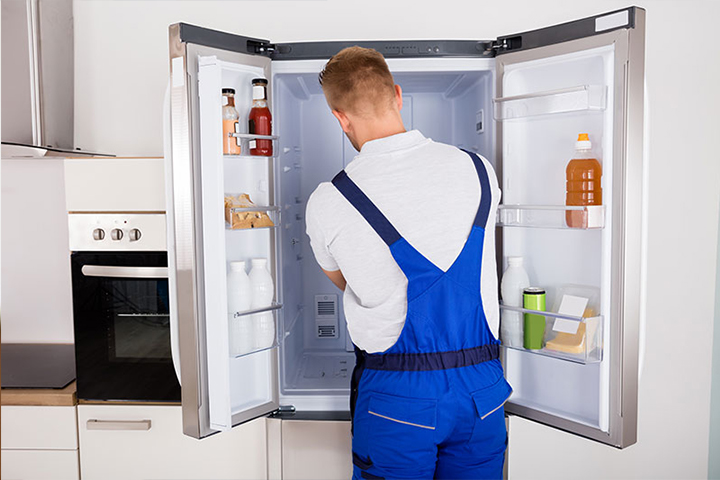Welcome to our comprehensive guide on DIY fridge repair tips. Refrigerators are essential appliances in any household, keeping our food fresh and drinks cold. However, like any other appliance, they can encounter issues over time. Knowing when to tackle these problems yourself and when to call a professional for fridge repair can save you time, money, and frustration. In this article, we’ll provide you with expert guidelines to help you make informed decisions about Sub Zero appliance repair in Pembroke Pines, FL.
Common Refrigerator Issues Explained
- Temperature Fluctuations: Your refrigerator’s inability to maintain a consistent temperature can stem from various factors. A faulty thermostat may inaccurately regulate temperatures, while damaged door seals can allow cold air to escape. Additionally, a malfunctioning compressor might struggle to maintain the desired temperature levels.
- Excessive Frost Build-Up: When frost accumulates excessively in the freezer compartment, it can hinder airflow and compromise your refrigerator’s performance. This issue often arises from a defective defrost heater, which fails to melt the frost, or a malfunctioning defrost timer, which regulates the defrost cycle.
- Water Leakage: Water leakage inside or around your refrigerator can result from several issues. A clogged drain tube prevents water from properly draining, leading to overflow. A damaged water inlet valve may cause leaks during the water dispensing process. Moreover, a faulty defrost system can cause excess water to accumulate and leak out of the appliance.
DIY Refrigerator Repair Techniques Explained
- Cleaning the Condenser Coils: Over time, dust and debris can accumulate on the condenser coils, hindering heat dissipation and causing your refrigerator to work harder. Regularly cleaning these coils improves energy efficiency and extends the lifespan of your appliance.
- Replacing Door Seals: Damaged or worn door seals compromise the airtight seal of your refrigerator, allowing cold air to escape and warm air to enter. Replacing these seals restores proper insulation and ensures consistent temperature levels inside the appliance.
- Unclogging Drain Tubes: A clogged drain tube prevents water from draining properly during the defrost cycle, leading to water accumulation and leakage. By clearing the obstruction using simple tools like a turkey baster or pipe cleaner, you can prevent water damage and restore proper drainage.
- Adjusting the Thermostat: If your refrigerator is not cooling adequately, adjusting the thermostat settings may help. Consult your appliance’s manual for instructions on calibrating the thermostat to achieve optimal cooling temperatures.
Essential Refrigerator Lifespan Tips
- Proper Temperature Settings: Set your refrigerator to the optimal temperature range recommended by the manufacturer. Keeping the temperature too low can strain the compressor and increase energy consumption while setting it too high can lead to food spoilage.
- Regular Defrosting: If your refrigerator has a manual defrost function, make sure to defrost it regularly to prevent excessive frost build-up. This not only improves energy efficiency but also helps maintain proper airflow within the appliance.
- Avoid Overloading: Overloading your refrigerator with food can restrict airflow and cause the appliance to work harder to maintain the desired temperature. Be mindful of the amount of food you store and avoid overcrowding the shelves and compartments.
- Check Door Seals: Periodically inspect the door seals for any signs of wear or damage. Damaged seals can compromise the efficiency of your refrigerator by allowing cold air to escape. Replace worn-out seals promptly to maintain proper insulation.
- Clean and Organize Regularly: Keep the interior of your refrigerator clean and well-organized to ensure optimal performance. Remove expired items, wipe down spills, and arrange food items in a way that promotes airflow. This simple maintenance routine can prolong the lifespan of your appliance and improve energy efficiency.
By following these essential tips, you can not only extend the lifespan of your refrigerator but also ensure that it operates efficiently for years to come, promoting Refrigerator energy saving.
When to Call the Pros
- Compressor Issues: Repairing or replacing a faulty compressor requires specialized tools and expertise. Attempting to fix compressor issues without proper training can exacerbate the problem and result in costly repairs.
- Refrigerant Leaks: Refrigerant handling poses significant health and environmental risks. Only certified technicians equipped with the necessary training and equipment should handle refrigerant leaks to ensure safety and compliance with regulations.
- Electrical Problems: Electrical issues within your refrigerator should be addressed by qualified professionals to avoid safety hazards. Tampering with electrical components without proper knowledge and precautions can lead to electric shocks or fires.
By understanding these common refrigerator issues and implementing appropriate DIY repair techniques, you can effectively troubleshoot minor problems and know when to seek professional assistance for more complex issues.
Conclusion
Knowing when to tackle DIY refrigerator repairs and when to call in the pros is essential for maintaining the efficiency and longevity of your appliance. By following the guidelines outlined in this article, you can address minor issues with confidence while ensuring that more complex problems are handled by qualified professionals. Remember, safety should always be your top priority when performing any appliance repairs.
FAQs
Q: How often should I clean the condenser coils of my refrigerator?
A: It’s recommended to clean the condenser coils at least twice a year to ensure optimal performance and energy efficiency.
Q: Can I replace refrigerator door seals myself?
A: Yes, replacing door seals is a relatively simple DIY task. However, if you’re unsure, it’s best to consult a professional technician.
Q: What should I do if I notice temperature fluctuations in my refrigerator?
A: Start by checking the thermostat settings and cleaning the condenser coils. If the issue persists, it’s advisable to seek professional assistance to diagnose and fix the problem accurately.
Ready to ensure your refrigerator’s longevity while maximizing energy efficiency? Contact Platinum Sub Zero Repair today for expert Sub Zero refrigerator repair in Pembroke Pines! For more expert tips on refrigerator maintenance, check out our previous blog: “Never Defrost Again: Sub Zero Refrigerator Maintenance Guide“.


